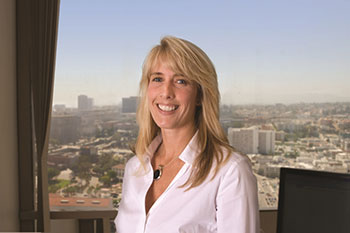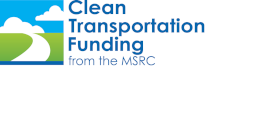 Stacy Alameida's interests have always been grounded in helping people change their behavior for the better. Although she didn't know that she would end up in the transportation arena, she has succeeded in combining her desire to better people's lives with her interest in bettering the environment.
Stacy Alameida's interests have always been grounded in helping people change their behavior for the better. Although she didn't know that she would end up in the transportation arena, she has succeeded in combining her desire to better people's lives with her interest in bettering the environment.
Stacy currently is one of the longest-serving members of the MSRC's Technical Advisory Committee (TAC); however, she didn't start out pursuing a career in transportation. She graduated from the University of California, Santa Barbara with a degree in industrial psychology hoping to get involved in labor relations. After graduation, she joined Bank of America to work in their human resources department. As luck would have it, B of A's ridesharing program was part of her responsibilities.
"I never planned on getting into transportation, but the rideshare program started in HR," Stacy explained.
She began by managing one work site for the rideshare program, and impressed her managers so much with her work that she promptly was promoted to working with multiple work sites. She managed B of A's rideshare program for the Los Angeles and Orange County regions for 10 years.
Stacy left Bank of America to start a family and continued working for the bank as a consultant for two years, when she learned about a job opportunity at Metro. In 2000, she took a position with Metro's HR department to manage its internal rideshare program.
"I earned my degree in industrial psychology with the goal of working in labor relations because I was really interested in affecting change," Stacy said. "But, ridesharing and getting people to take alternatives modes of transportation are aimed at changing people's behavior and the idea of 'getting to yes,' so this work is well-suited to my background."
Because of her extensive experience with transportation demand management programs like ridesharing, Stacy eventually was moved up to Metro's Long Range Planning Department where she serves as a Transportation Planning Manager, overseeing a number of air quality improvement programs. She is responsible for Metro's Congestion Management Program, manages Metro's emissions credits, and works on the long- and short-range regional transportation plans, just to name a few.
She began serving on the TAC just four years after joining Metro and one of the reasons for her long tenure on the TAC is that she really enjoys the role she plays in helping to improve air quality. "I like the idea that the projects we fund make a difference," Stacy remarked. "I was driving home the other day and I saw a waste hauler with the MSRC's logo displayed on the back and saw that we are really making a difference, vehicle-by-vehicle, program-by-program that we fund - and I like that."
Stacy feels that the TAC serves a vital role for the MSRC. "As TAC members, it's important for us to TAC serves a vital role for the MSRC. "As TAC members, it's important for us to be investigating and researching projects we could fund, and to take this information to the MSRC members." Stacy's goal is to bring a progressive approach to funding new projects. "We try to get them to go outside the box when funding projects, and the MSRC has to have the information to be able to do that."
Stacy's role at Metro allows her to provide invaluable input to both the TAC and the MSRC on potential projects. "Because the LA County region is so large and diverse, my position at Metro gives me the unique opportunity to provide input about the wide-range of projects that could be funded."
And some of the MSRC's best projects, in her opinion, have been right up her alley. "I'm a ridesharing girl so I like the projects involving transportation control measures, like the most recent project we did to reduce congestion around Dodger stadium by getting people to take public transportation to the games via the Dodger Stadium Express."
Other projects in which Stacy has enjoyed taking part include those where the MSRC has helped make a change for the better to a project partner's usual way of doing things - a change that might not have occurred without funding from the MSRC. She mentioned the project that the MSRC helped fund at Rossmoor Pastries in Signal Hill in 2006, where the bakery owner not only installed a CNG dispenser to fuel his delivery vans, but has now become a spokesperson for CNG advocating to bakery and business groups on the benefits of CNG in their industry.
"The project with Rossmoor Pastries and the chance to work with a small business owner like Charles Feder was really special. I love to see that kind of story where you can see the enthusiasm of the funding recipient and where we are able to affect real change. We were able to make a difference with someone who may not have done the project at all if it wasn't for the MSRC," Stacy commented.
Stacy is excited about the work that the TAC is doing now to develop recommendations for the MSRC as it develops next year's work program and the big impact future MSRC-funded projects can make. "The MSRC has the sole goal of reducing air pollution from mobile sources in the South Coast - there are other funding sources out there that target parts of that, but that's not their only focus," according to Stacy. "Most of the air pollution problem comes from on-road sources, so MSRC projects are getting to the heart of the problem." Stacy looks forward to helping the MSRC continue its work to change the behavior of people, agencies and businesses in a way that improves air quality for us all.
